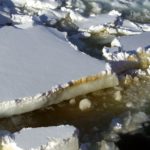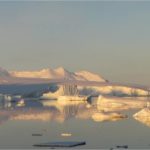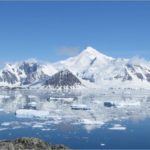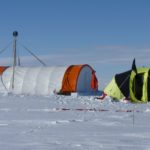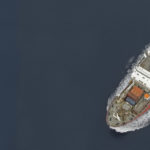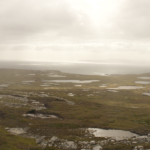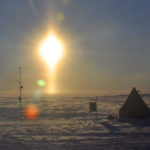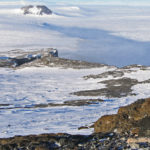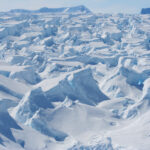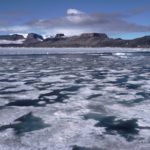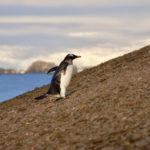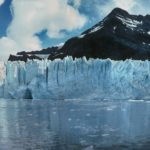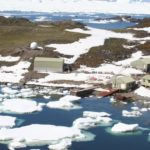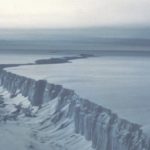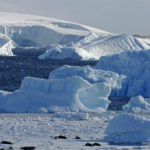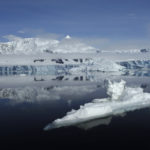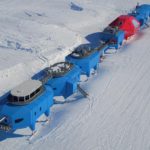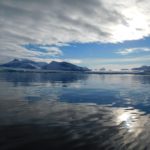The Antarctic is a pivotal part of the Earth’s climate system and a sensitive barometer of environmental change. Although remote and inhospitable, Antarctica is Earth’s most powerful natural laboratory. Understanding how the Antarctic is responding to current climate change – and what the continent was like in the past – is essential if scientists are to be able to more accurately predict future climate change and provide accurate information to politicians and policy makers.
British Antarctic Survey (BAS) has for the past 60 years been responsible for most of the UK’s scientific research in Antarctica and its current five-year research strategy is focussed on deepening our understanding of climate change.
Antarctic ice cores reveal the clearest link between levels of greenhouse gases in the atmosphere and the Earth’s temperature. They show that the temperature of the climate and the levels of greenhouse gases are intimately linked. In 2004, ice core scientists at BAS working together with colleagues from other European nations successfully extracted a three-kilometre ice core from the Antarctic. This core contains a record of the Earth’s climate stretching back 800,000 years – giving us by far the oldest continuous climate record yet obtained from ice cores.
BAS geologists can look back even further in time. By studying Antarctic rocks and sediments from the sea and lake beds, they are able to get a picture of what the Antarctic was like millions of years ago when the continent was warm and supported plants and animals such as dinosaurs. Understanding how the ice sheets that currently cover the continent developed and how they have receded in the past is essential if we are to be able to predict how those ice sheets will behave in a warmer world.
Much of BAS science is done on the Antarctic Peninsula – one of the fastest warming parts of the planet. BAS glaciologists are also studying the West Antarctic Ice Sheet, parts of which are thinning rapidly. Their work is crucial to understanding whether this thinning could signal the start of the ice sheet’s collapse, an event that would cause sea levels to rise much more than currently predicted.
On sea as well as on land, BAS scientists are investigating climate change. As the waters warm around Antarctica, ecologists at BAS are looking at how penguins, seals and the other species that make up one of the world’s largest marine ecosystems are responding.
Because the causes and effects of climate change are extraordinarily complex, assembling all the pieces of the climate change jigsaw is a huge challenge. By conducting world-class science in the Antarctic, BAS is making a significant contribution to meeting this challenge.
The cause of the variability in atmospheric CO2 over glacial-interglacial timescales has been a puzzle since its discovery in the early 1980s. It is widely believed to be related to …
Sea-ice is frequently cited as a likely driver and propagator of abrupt climate change because of the rapid and far-reaching impact of its feedbacks. However, numerical climate models are still …
During the Last Interglacial (129-116 thousand years ago, ka) CO2 and global temperature were both higher than they were before human industrialisation. By examining Last Interglacial climate, we thus gain …
The Antarctic Peninsula and West Antarctica have warmed dramatically in recent decades, with some climate records indicating that these are among the most rapidly warming regions on Earth. The Antarctic …
Changes in wind strength and circulation patterns above the Antarctic Peninsula are linked to its warming and increased upwelling of warm circumpolar deep water, resulting in accelerated melting and thinning …
In order to assess the impact of anthropogenic carbon dioxide (CO2) on the oceans today we are investigating the effect of decreasing upper ocean pH on calcifying zooplankton. Pteropods, …
This research focuses on investigating the glacial histories of Arctic ice sheets and ice caps using the marine geological record preserved on continental margins. By reconstructing past ice sheets, their …
In this NERC-funded project, we are generating Southern Hemisphere Westerlies (SHW) proxy records from each of the three major sectors of the Southern Ocean, focusing on subantarctic islands situated in …
The polar ice sheets play a major role in controlling Earth’s sea level and climate, but our understanding of their history and motion is poor. The biggest uncertainty in predicting …
This project will reconstruct millennial-scale ice sheet change in the western Amundsen Sea Embayment, Antarctica, using high-precision exposure dating.
Page 4 of 5«
1
2
3
4
5
»Last »
1 June, 2023
Concern is rising about tipping points in the Antarctic region (Armstrong et al., 2022). Recent heatwaves, changes in the Southern Ocean, and a reduction in the extent of Antarctic sea …
27 October, 2022
Introduction Understanding Antarctic warming and its consequences is vitally important for our planet. Parts of Antarctica, including the Antarctic Peninsula and West Antarctica, have experienced significant warming over the last …
Page 1 of 1381
2
3
…
138
»Last »
11 April, 2017
One of Antarctica’s biggest gentoo penguin colonies was repeatedly decimated by eruptions of the Deception Island volcano in recent millennia.
17 March, 2017
A new study reveals the sub-antarctic island of South Georgia – famous for its wildlife – was covered by a massive ice cap during the last ice age. The results …
2 March, 2017
BAS Director features in photographic portraits of women in science
1 March, 2017
A World Meteorological Organization (WMO) committee of experts announces this week (Wed 1 March) new records for the highest temperatures recorded in the Antarctic Region. The results are part of …
21 February, 2017
British Antarctic Survey (BAS) recently captured this video footage of a huge crack in the Larsen C Ice Shelf, on the Antarctic Peninsula. Currently a huge iceberg, roughly the size …
16 February, 2017
This year the extent of summer sea ice in the Antarctic is the lowest on record. The Antarctic sea ice minimum marks the day – typically towards end of February …
18 January, 2017
Leading scientists gather at Davos today (18 January), with Al Gore and Christiana Figueres, for an urgent meeting on Arctic change. Growing concern prompts ‘Arctic Basecamp’ at World Economic Forum …
15 January, 2017
British Antarctic Survey scientist Dr Emily Shuckburgh OBE has co-authored a book on climate change as part of the new Ladybird Expert series, it was announced today. Her co-authors are His …
15 January, 2017
A new blog post from a team comprising polar atmosphere and ice chemist Holly Winton, analytical chemist Rebecca Tuckwell and atmospheric and glaciochemist Markus Frey who are working on the …
21 December, 2016
Science Summit will call on global leaders for immediate action on the Arctic A group of leading scientists have announced an Arctic Science Summit that will take place in Davos, …
Page 12 of 16«
1
…
10
11
12
13
14
…
16
»Last »

